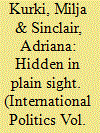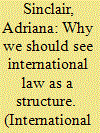|
|
|
Sort Order |
|
|
|
Items / Page
|
|
|
|
|
|
|
| Srl | Item |
| 1 |
ID:
098461


|
|
|
|
|
| Publication |
2010.
|
| Summary/Abstract |
This article argues that constructivism in International Relations (IR) suffers from certain important shortcomings in its analysis of the idea of social context. Specifically it is argued that constructivists fail to adequately engage with 'social structural' forces in world politics. While constructivists have pitched themselves as theorists who aim to account for the role of social context in world political inquiry, their conceptual focus on ideational factors - rules, norms and inter-subjective beliefs - has resulted in an inadequate, or incomplete, conceptualisation of social structure. Constructivists, it is argued here, tend to leave the role of materially embodied social structures theoretically and empirically unexplored. The limitations of constructivist treatments of social context have significant consequences for their analysis of world politics, for example, for recent constructivist attempts to deal with international law. Constructivist interventions into analysis of law remain deficient in important senses because of their failure to conceive of international law in social structural terms and because of their inability to explore in depth law's relationship with other social structures, such as patriarchy or capitalism. This entails that the structured systems of inequality and hierarchy embodied in law fail to be adequately recognised. Recognising the 'incompleteness' of the constructivist accounts of social context, we argue, is important in highlighting the often un-noted limitations of constructivist scholarship and in potentially redirecting constructivist scholarship towards closer engagement with 'critical theory' investigations into IR and law.
|
|
|
|
|
|
|
|
|
|
|
|
|
|
|
|
| 2 |
ID:
105641


|
|
|
|
|
| Publication |
2011.
|
| Summary/Abstract |
he aim of this article is to provide International Relations (IR) theorists with a better understanding of law. This is important for all IR theorists, not just those who focus on international law, because the legalistic way of viewing the world colours all aspects of our world, from teaching us what justice is and providing the means to achieve it, to framing our understanding of human relations and giving us the language of rights with which to articulate it. This article has two main goals: first, to question our own assumptions about law; and second, to introduce IR theorists to the basics of legal methodology and demonstrate how law actually operates.
|
|
|
|
|
|
|
|
|
|
|
|
|
|
|
|
| 3 |
ID:
178492


|
|
|
|
|
| Summary/Abstract |
This article identifies how three dominant ideas of international law (as a process, an institution and a practice) see its agency, concluding that all three share a reluctance to see international law as doing anything more than enabling the operation of other actors, forces or structures. This article argues that we should see international law as a structure because it possesses both the surface structure of rules, principles, processes, personnel and material elements of the international legal system and a deep structure of values that sits deep within our subconscious. As Shklar’s idea of legalism shows us, legalism plays a powerful role in shaping all our understandings of ourselves and the world that surrounds us. Seeing international law as a structure enables us to see how it locates actors within a social hierarchy and how it behaves in similar ways to recognised structures like capitalism and racism.
|
|
|
|
|
|
|
|
|
|
|
|
|
|
|
|
|
|
|
|
|